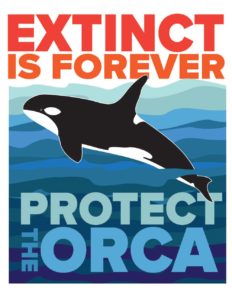The news of J35’s deceased calf has hit us all hard. She carried her deceased daughter for 17 days and hundreds of miles – it was truly heartbreaking to see this mother orca mourning the death of her newborn calf. It is also a stark reminder of the trouble the Southern Resident Killer Whales are in.It is also a stark reminder of the trouble the Southern Resident Killer Whales are in.
We too are mourning J35’s loss, and every loss of the endangered Southern Resident killer whales. The Southern Resident orcas are down to just 75 whales – this is the lowest number in 30 years. In 2005 they numbered 88 when Southern Resident Killer Whales (SRKWs) were listed as endangered under the federal Endangered Species Act.
Southern Resident orcas are the icon of the Salish Sea, they are critically endangered, and they need all of our help.
What you can do to help the Southern Resident killer whales (SRKW) today:
1. Help the whales get enough to eat: The Salish Sea includes the core summer foraging area for the SRKWs. Tell the Pacific Salmon Commission to allocate 500,000 Chinook salmon from all west coast rivers for the endangered SRKWs. Email the Pacific Salmon Commission: [email protected] and copy the Pacific Fishery Management Council: [email protected].
Based on estimates of food requirements the average SRKW may consume about 18-25 adult salmon daily just to maintain their energy requirements. Using the low end of the spectrum, that means that about 1,500 salmon are required each day to sustain our SRKW population. That means we need at least 500,000 salmon a year if we want the population to grow. Learn more from the Center for Whale Research.
2. Elected officials need to hear from you: Governor Inslee established the Southern Resident Killer Whale Recovery Task Force to determine the significant and immediate actions needed to protect and recover the SRKWs. Contact Governor Inslee and your state senators and representatives and tell them to:
- Give SRKWs their fair share of the salmon – follow Canada’s lead and take immediate action to increase prey availability and conserve Chinook salmon.
- Reduce vessel noise – give SRKWs the protection they need to communicate and hunt for the scarce Chinook salmon.
- Protect our shorelines – healthy shorelines, eelgrass, and spawning beaches are needed for the forage fish that Chinook salmon depend on.
Click here to Contact Governor Inslee or call: 360-902-4111.
Click here to find and contact your Washington State representatives.
Contact the Governor’s Southern Resident Task Force through this public portal to give them recommendations about what you think should be done to help the orcas: https://www.surveymonkey.com/r/srkwtfpubliccomment.
3. Help keep Friends of the San Juans at the table so we can advocate for quieter seas, shoreline protection, and more food for SRKWs in local, state, federal and transboundary task forces, committees, and forums.
more food for SRKWs in local, state, federal and transboundary task forces, committees, and forums.
The orcas must consume thousands of salmon every year to survive; in turn salmon must eat thousands of forage fish; and forage fish need natural shorelines on which to lay their eggs. All of Friends’ programs help the Southern Residents and this web of connections we all share and depend on – your support is an integral part of this work.
Click here to donate to our Orca Protection Fund. Your gift to this fund will support our orca protection work, including participating in the SRKW Task Force through the Vessels Working Group where we will advocate for the needs of SRKWs.
The Southern Resident orcas are in trouble and we must all join together and change our behaviors in order to protect them and restore their population and the health of the entire Salish Sea ecosystem. We will keep moving forward and hope that this work saves J35 and her beautiful extended family of orcas.
Thank you for your voice and support as we continue to engage in this critical work together.
Photo above by Taylor Shedd/Soundwatch (photo taken under NMFS MMPA permit #21114).

1 thought on “We’re heartbroken about J35 – What we can do to help.”
Comments are closed.